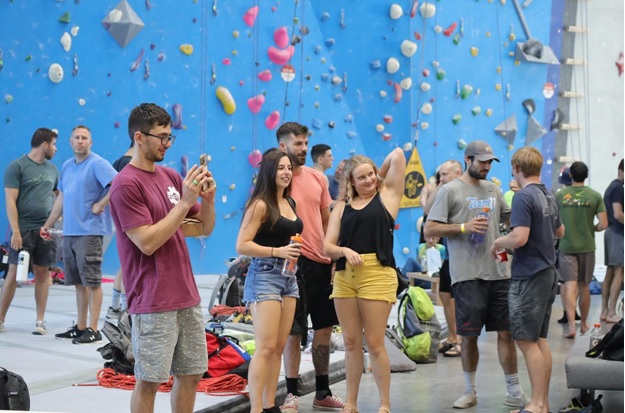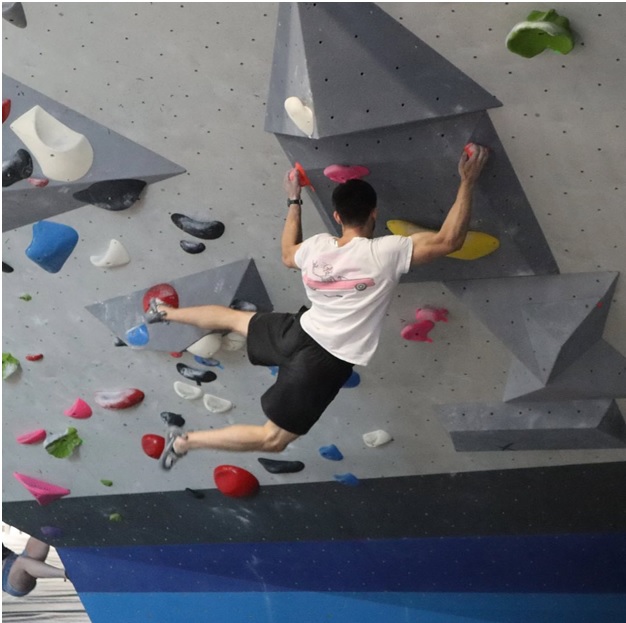
Rock Climbing for Beginners: What You Need
It’s hardly a secret that rock climbing can be an excellent workout with a very wide range of benefits. It’s low impact, can improve stamina, flexibility, and strength, and offers an even wider range of musculoskeletal and cardiovascular benefits.
It can be intimidating to get into the sport, though, especially if you don’t have someone to show you the proverbial ropes – and there are quite a few of them in rock climbing!
If you’re a beginner that’s thinking about getting into rock climbing and you are ready to get more serious about pursuing your interest, here’s what we can offer you.
What We Offer: Rock Climbing For Beginners
Here at Reach Climbing & Fitness, we offer a number of different activities and classes specifically designed to target rock climbing for beginners.
- Staff Belay
We offer one hour staff belay slots throughout the week, in which a member of our staff will personally handle the safety equipment so you can focus on getting familiar with climbing without having to learn how to manage the rope systems.
Staff Belay sessions are perfect for first-time climbers, as well as for newer climbers who haven’t yet learned how to belay. Slots are available for groups of 1 to 4 climbers.
This is also an excellent option for children, but all ages are welcome! Staff belay sessions are one hour long and include all necessary equipment – so all you need to worry about is following our staff members’ instructions and having as much fun as you can.
It’s the ideal experience for rock climbing for beginners.
- Bouldering and Auto Belays
We also offer bouldering and auto belaying, which do not require registration. Just purchase a day pass and rent some rock climbing gear (we have all you’ll need) and you can get started. A short safety orientation is required.
Bouldering does not use ropes! Instead climbers climb shorter walls over safety mats.
Autobelays are mechanical devices that allow climbers without partners (or without much experience) to climb our full length walls.

Though beginners are welcome to try their hand at bouldering or to use the autobelays, participants must be 14 years or older or under the direct supervision of a trained adult.
- Introductory Belay Classes
We also offer introductory belay classes that are perfect for beginner rock climbers that want to get more seriously involved in the sport. By learning to become a belayer, you can rock climb with a partner and be “on the other end of the rope.”
Belaying is the process of managing ropes for the climber, allowing them to safely climb routes higher above the ground. With a belaying partner, you won’t need to use an autobelay and you can get more involved in the sport.
Our introductory belay class, which is free for our members and $35 for non-members, is 90-minutes long and geared for climbers with little to no climbing experience at all.
Once you complete our Top Rope Belay course, you can climb when you want, where you want, without needing to rely on our staff members or on an autobelayer.
Participation in this class is intended for beginners, but participants must be 14 years or older. We provide necessary equipment for the class and it comes with a free day pass for the remainder of the day.
What You’ll Need If You Decide to Talk Up the Sport of Rock Climbing
If you’re a beginner and you’re interested in rock climbing, you might get to the point where you don’t want to rent equipment every time you go climbing.
While we provide equipment for specific classes if you’re interested in getting your own, here are some of the most important, indispensable pieces of gear for climbing.
- Appropriate, comfortable clothing
You don’t necessarily need to get specific clothing for climbing, just like you don’t necessarily need to get specific clothing for hiking, camping, or other outdoor sports.
However, there are clothes that are good for rock climbing and clothes that are not. As a general rule, clothing should be light (unless it’s cold), breathable, and wick away sweat. It should not be loose or baggy as these types of clothing can interfere with ropes, your range of motion, and with your visibility.
- Rock climbing shoes
Climbing shoes are specifically designed for rock climbing. They fit tightly to your feet and have almost-tacky rubbery soles and sharply pointed toes.
These types of shoes make it easier for your feet to feel the holds on the rock wall, and the pointed tip gives you more dexterity and leverage on tiny, narrow holds.
A rock climbing harness consists of a waist belt and leg loops that go around each leg and support your weight. Climbing harnesses have tie-in points and belay loops for connecting to the climbing ropes which can support you and protect you in the event of a fall.
- Climbing ropes

The most important piece of safety equipment for rock climbing, there are two basic types of climbing ropes: dynamic and static. For most rock climbing applications, dynamic rope is used because it is more effective at absorbing the energy involved in arresting the fall of a climber. They are more elastic than static ropes.
- Carabiners/quickdraws
A carabiner is a metal clip with a spring-loaded gate that is used to connect equipment and climbing ropes together, or to technical equipment such as climbing anchors or belay devices.
Carabiners are also used to make quickdraws, which are devices consisting of two carabiners connected either by a short section of rope or of more rigid materials. These are used to establish quick connections between climbing ropes and equipment.
- Belay device
A belay device is a tubular piece of metal that attaches to your climbing harness and is used to control the rope. A belayer can use the belaying device to increase or decrease friction on a climbing rope, either for the purpose of paying it out or of arresting a climber’s fall.
Ready to Get Started with Rock Climbing for Beginners?
Fortunately, if you’re interested in rock climbing for beginners, we’ll provide everything you need to get started. This is just a list of things you’ll need if you want to take your hobby to outdoor climbing.
Either book your appointment through our website or get in touch with us for more information at 484-704-7612.


No Comments